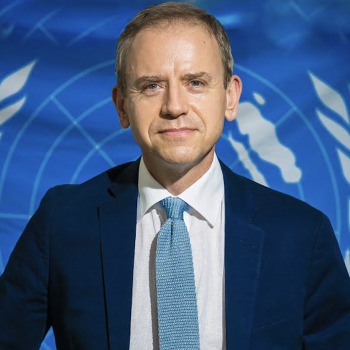A new roadmap to sustainable development in Kenya, powered by public/private partnerships at scale
Resident Coordinator Stephen Jackson offers the Government of Kenya a “one stop shop” entry point for strategic development engagement and a more cohesive UN offer to help advance the Sustainable Development Goals (SDGs) at scale.
- The new framework for the UN’s development work in the country, the UN Sustainable Development Cooperation Framework (2022-2026), was agreed with the Government after listening to all parts of society through a yearlong process of consultations, in which the Resident Coordinator brought together the 25 UN agencies, funds and programmes in the UN Country Team with the Government (nationally and locally), civil society, private sector and international partners.
- The priorities agreed in the Cooperation Framework are closely aligned with the Government’s national plan for sustainable development towards “Kenya Vision 2030”, and are rooted in a ground-breaking "Leave No One Behind” report led by the Resident Coordinator’s office and launched by then President Kenyatta (March 2022). The Cooperation Framework puts forward two integrated strategic priorities – (1) People and Peace, and (2) Planet and Prosperity – designed to maximize the opportunity for joined-up programming. The UN Country Team has committed to reach 50% joint programming over the next four years.
- The Resident Coordinator has further transformed the SDG Partnership Platform to help unlock innovative investments, financing and public/private partnerships to serve as a strategic enabler for the implementation of the Cooperation Framework. At the request of the UN Country Team, the Platform is hosted by the Resident Coordinator’s office as one impartial entry point to the UN offer, operating in the interest of all UN entities.
- The Platform – with support from the UN’s Joint SDG Fund – led to the launch in 2022 of the world’s first Development Impact Bond for Adolescent Reproductive and Sexual Health. The platform has also attracted international private sector investments at scale in the primary health sector by identifying a $6 billion bankable market opportunity. This enabled private sector consortia to bring to scale upgrading 200 basic public health clinics, and supported a major effort to expand health insurance coverage. The SDG Partnership Platform has now received requests from 7 UN Resident Coordinator’s offices across Africa to advise on adapting the Platform model to their national contexts.
- Finally, the Resident Coordinator is now leading a process with the newly elected Deputy President to streamline, structure and align dialogue between the Government and international partners for cooperation across both the development and humanitarian sectors.
Read the Case Study on coordination results in Kenya here.
Kenya
Africa


